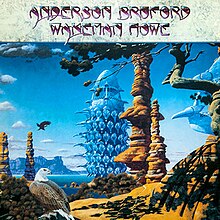Anderson Bruford Wakeman Howe (album)
| Anderson Bruford Wakeman Howe | ||||
|---|---|---|---|---|
 |
||||
| Studio album by Anderson Bruford Wakeman Howe | ||||
| Released | 20 June 1989 | |||
| Recorded | 1988–1989 | |||
| Studio | La Frette Studios (Paris, France) AIR Studios (Montserrat, British West Indies) AIR Studios (London, England) |
|||
| Genre | ||||
| Length | 59:05 | |||
| Label | Arista | |||
| Producer | ||||
| Anderson Bruford Wakeman Howe chronology | ||||
|
||||
Anderson Bruford Wakeman Howe is the only studio album by the English progressive rock band Anderson Bruford Wakeman Howe, released in June 1989 on Arista Records. The group formed in 1988 after singer Jon Anderson left Yes and reunited with former Yes members Bill Bruford, Rick Wakeman, and Steve Howe to start a new band. A selection of demos were put down in France before recording took place in Montserrat and London, during which Bruford suggested Tony Levin play bass on the album. Several artists receive songwriting credits, including Geoff Downes, Max Bacon, Rhett Lawrence, and Vangelis.
Anderson Bruford Wakeman Howe received a warm critical and commercial reception upon its release, reaching No. 14 on the UK Albums Chart and No. 30 on the US Billboard 200. In August 1989, the album was certified gold by the Recording Industry Association of America (RIAA) for selling 500,000 copies in the US. The band released "Brother of Mine", "Order of the Universe", and "I'm Alive" as singles in 1989.
The project began in 1988. At that time vocalist Jon Anderson had felt artistically constrained within Yes's current format, where the songwriting of Trevor Rabin had taken the band in a commercially very successful but musically and lyrically different direction. Anderson regrouped with Steve Howe, Rick Wakeman and Bill Bruford. Bruford, who had at various times been a member of King Crimson, recruited his Crimson band mate Tony Levin as their bassist. The group was unable to use the name Yes for legal reasons. However, the group did have Arista assign the catalog number of 90126 to the original releases of the CD and cassette. This was a subtle way of stamping this as the next Yes album after 90125 (1983).
...
Wikipedia
